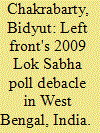| Srl | Item |
| 1 |
ID:
153422


|
|
|
|
|
| Summary/Abstract |
Cambodia’s youthful population is significantly responsible for a recent unexpected decline in the popularity of the Cambodian People’s Party, which has governed since the end of the Khmer Rouge regime. This increasingly young electorate has lived through an era of peace and openness with regular multi-party elections and impressive economic growth resulting in rapid structural change in the economy. Compared to their parents’ generation, this younger generation is better educated, highly mobile, aspires to salaried employment, and is well connected to new sources of information and technology. Because of this, their expectations, aspirations, opportunities, as well as challenges they face are remarkably different from those of older generations. However, Cambodia’s institutions of governance, dominated by personalized and patron–client networks that have been propped up by the ruling elite, has effectively marginalized this emerging youth population. This marginalization from political and economic resources has produced alienation and discontent, which represents a significant political problem for the ruling party’s political strategies.
|
|
|
|
|
|
|
|
|
|
|
|
|
|
|
|
| 2 |
ID:
104107


|
|
|
|
|
| Publication |
2011.
|
| Summary/Abstract |
Left front's 2009 Lok Sabha poll debacle in West Bengal, India
This paper demonstrates that left front is no longer unassailable in West Bengal after three decades of rule. It identifies the specific reasons for the Left front electoral debacle in the 2009 Lok Sabha elections. The paper also argues that the left front is caught between the contrasting imperatives of adapting to changing socioeconomic conditions in liberalizing India, while concurrently attempting to remain true to its traditional communist ideology and support base in a globalized world
|
|
|
|
|
|
|
|
|
|
|
|
|
|
|
|